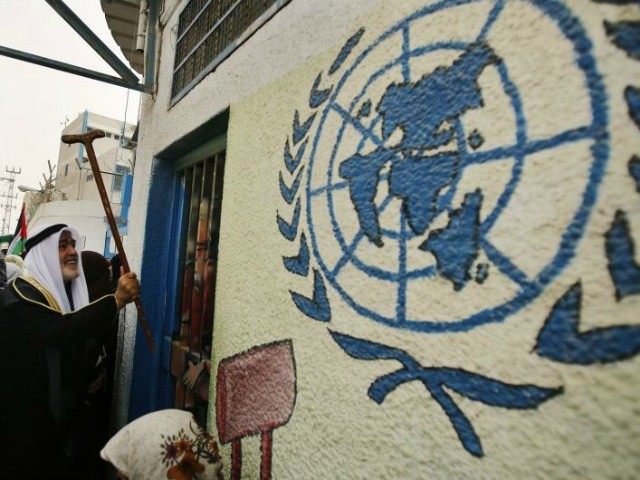TEL AVIV – Amid worsening relations with the Palestinians, the Trump administration is now considering rejecting the UN’s definition of Palestinian “refugees” and cutting off all financial aid to the agency that caters to them, an Israeli TV report said Tuesday.
According to a Hadashot News TV report, the State Department is mulling an end to all of its $360-million annual aid to United Nations Relief and Works Agency (UNRWA) after it already froze a payment to the organization of more than $100 million in January. The report said the move was a “new ultimatum” to pressure the Palestinian Authority into returning to the negotiating table with Israel.
The White House is also considering formally declaring that it rejects UNRWA’s mandate that stipulates that so-called Palestinian refugees from 1948 can perpetually pass their refugee status from generation to generation – the only refugees in the world that bear this status. Of the estimated half million Palestinians who fled or were pushed out of their homes after the State of Israel’s establishment, only a few thousand remain. However, the number of refugees has ballooned to some 7.2 million of their descendants worldwide.
Breitbart’s Aaron Klein reported on the manner in which UNRWA has altered the traditional definition of refugees. Klein documented:
The UNHRC, the international body that ministers to all refugees besides Palestinians, has a fairly sensible definition of what a refugee is: “A refugee is someone who has been forced to flee his or her country because of persecution, war or violence. A refugee has a well-founded fear of persecution for reasons of race, religion, nationality, political opinion or membership in a particular social group.”
In other words, the UNHRC defines a refugee as someone who was forced to flee his or her home and cannot return for fear of persecution.
UNRWA, however, defines a Palestinian “refugee” entirely differently. A Palestinian “refugee” is any person whose “normal place of residence was Palestine during the period 1 June 1946 to 15 May 1948 and who lost both home and means of livelihood as a result of the 1948 conflict.” So UNWRA counts as “refugees” any local Arab who lived in Palestine for as little as two years, knowing that scores of Arabs immigrated to the area during those years in search of employment amid talks of creating a future Jewish state.
UNRWA states that “Palestine refugees are persons who fulfill the above definition and descendants of fathers fulfilling the definition.”
This means that even if original Palestinian “refugees” long ago immigrated to another country and became citizens of that country, they and their descendants are still considered “refugees” according to UNWRA. The very definition flies in the face of what a refugee is supposed to be. It is also in direct contrast to the Convention on Refugees, which dictates that a person who “has acquired a new nationality, and enjoys the protection of the country of his new nationality” is exempted from the status of refugee.
UNRWA’s definition of a “refugee” doesn’t mention UNHCR’s “well-founded fear of being persecuted.” Indeed, the Palestinians have no fear of being persecuted by Israel, and would not be considered a “refugee” under ordinary international criteria.
Meanwhile, one of the sticking points in peace talks has been the Palestinian demand for the “right of return” – i.e., that so-called refugees would be able to return to their original homes – something that Israel will never accept because it would mean the end of the Jewish nature of the country.
On Thursday, Trump warned the U.S. would stop aid if the Palestinians continued to refuse to enter talks with Israel.
“That money is not going to them unless they sit down and negotiate peace, because I can tell you that Israel does want to make peace, and they’re going to have to want to make peace too, or we’re going to have nothing to do with it any longer,” he said at Davos.
UNRWA chief Pierre Krahenbuhl on Tuesday said the U.S. move “has a political dimension that I think should be avoided.” He called on other countries to send aid to the tune of $800 million to assist Palestinian refugees in Syria, Gaza and the West Bank.
U.S. Ambassador to the UN Nikki Haley has been vocal about her support for cutting aid to the Palestinian Authority in response to its “pay-for-slay” program awarding terrorists and their families salaries, as well as its general attitude to the U.S., which includes severing ties after President Donald Trump recognized Jerusalem as Israel’s capital. Other officials are reportedly opposed to the cuts. Among them are Secretary of State Rex Tillerson and Defense Secretary James Mattis, who believe that doing so would only worsen the situation in the region, especially in neighboring Jordan, which is home to hundreds of thousands of so-called Palestinian refugees.
Earlier this month, Trump sparked outrage from the Palestinian leadership when he asked why the U.S. should make “any of these massive future payments” to the Palestinians.
Trump tweeted, “We pay the Palestinians HUNDRED OF MILLIONS OF DOLLARS a year and get no appreciation or respect. They don’t even want to negotiate a long overdue peace treaty with Israel” and added “with the Palestinians no longer willing to talk peace, why should we make any of these massive future payments to them?”
“We have taken Jerusalem, the toughest part of the negotiation, off the table, but Israel, for that, would have had to pay more,” he continued.
In a two hour address to the Palestine Liberation Organization, Palestinian President Mahmoud Abbas slammed Trump over the tweet, saying, “May your house come to ruin.”
The White House is also considering shuttering the Washington offices of the PLO, the TV report said.

COMMENTS
Please let us know if you're having issues with commenting.